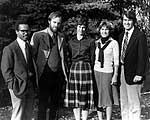Five and Time
Time reunites five former co-workers
By H. Jay Burns, Photos from Muskie Archives and Special Collections Library and Phyllis Graber Jensen
In the fall of ’78, the Bates admissions staff members gathered for a group photo with their new dean, Bill Hiss ’66.

Fall 1978: (from left) Marcus Bruce ’77, Bill Hiss, Ginny Harrison ’63, Karen Harris ’74, and Wylie Mitchell.
Collectively, the five staffers — from left, Marcus Bruce ’77, Hiss, Ginny Harrison ’63, Karen Harris ’74, and Wylie Mitchell — had four years’ admissions experience. The new dean had none. Little could they imagine that 26 years later — as they gathered again to celebrate the retirement of their friend and colleague Harrison, associate dean of admissions — that their collective Bates service would top out at what Mitchell, now dean of admissions, calls “125 years of experience/fun/rewards/satisfaction/pride.” Given that admissions professionals move around like military families, the five’s long service may be unique. “I don’t know if another college can point to five admissions folks who have stayed connected to their institution as we have,” Mitchell says.
After his own deanship from 1978 to 1991, Hiss has served as a Bates vice president, now focusing on external affairs. Bruce went on to earn his Ph.D. at Yale and is a Bates professor of religion. Harris earned her M.B.A. at Yale and entered a business career and has remained an active Bates volunteer, now as Trustee.

Summer 2004: (from left) Marcus Bruce ’77, Bill Hiss, Ginny Harrison ’63, Karen Harris ’74, and Wylie Mitchell.
Bates admissions would later gain fame for not only dropping SAT requirements but also tracking effects of the change through aggressive computer analysis. But first the staff had to get computers. In the fall of ’78 “we were just figuring out how to run an admissions office,” Hiss admits. After the super-organized Mitchell noted that each applicant’s name and address was being typed upwards of 23 times during the admissions process, Hiss says he “served notice on President Reynolds that we were getting computers no matter what they cost.”
From Reynolds came the order to expand the applicant pool — in social, economic, and geographic terms — into what became and remains a more diverse and national student body. Diversity issues were at the forefront, Bruce agrees. “The staff had a commitment to continuing what has always been a tradition at Bates,” says Bruce, whose Bates admissions skills later paid off during his Yale graduate studies, where he earned $1 per folder as an admissions reader.